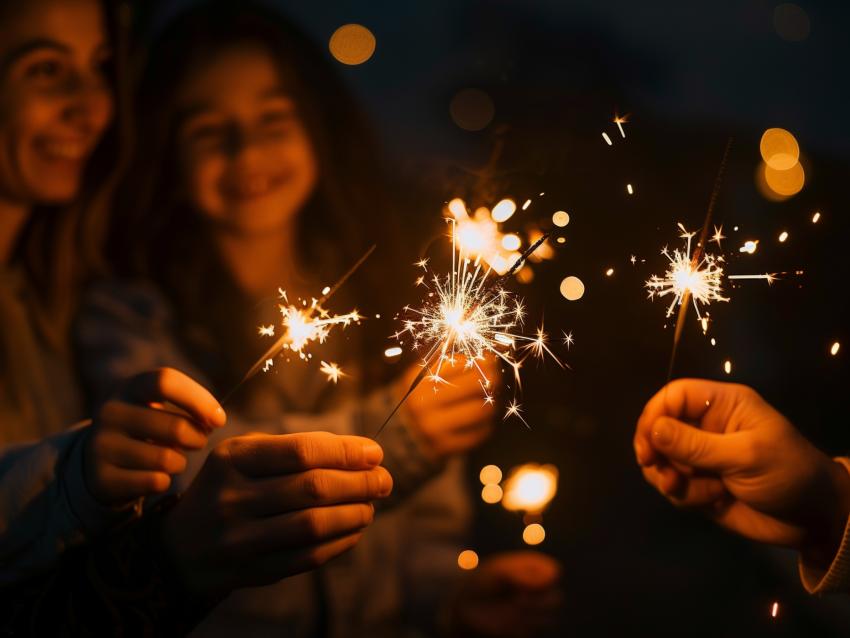
Firework Safety Tips from KIPRC Fire Expert
Fireworks are a common part of Independence Day (July 4th) celebrations. In addition to public and corporate firework displays produced by trained professionals, private individuals often choose to set off fireworks to celebrate the holiday. Fireworks can be a fun and traditional way to celebrate our nation’s birthday, but they can lead to serious injuries if they aren’t used carefully.
According to the US Consumer Product Safety Commission (CPSC), about 9,700 people were treated in hospital emergency departments in 2023 for firework-related injuries. At least eight people died from injuries related to private firework use in 2023, with five of those fatalities due to misuse of a firework. Two of the fatalities were caused by a firework malfunction, while the cause of one fatality is unknown. CPSC data show that about 67% (2/3) of those injured by fireworks in 2023 were male, while 33% (1/3) were female. Victims aged 15-19 had the highest estimated rate of emergency department treatment for fireworks-related injuries.1 Approximately 2/3 (66%) of all firework injuries reported in 2023 occurred during the period from one week before Independence Day to one week after the holiday.2
Robert McCool, the Fire Prevention and Safety Program Coordinator at the Kentucky Injury Prevention and Research Center (KIPRC), emphasizes that safety is crucial for enjoying these displays.
To reduce the chance of injury while using fireworks, McCool shares these tips to ensure a joyful and safe celebration:
- Only purchase and use fireworks that are legal for use in Kentucky. Some types of fireworks are not legal in Kentucky.
- If you choose to allow teens to ignite fireworks, supervise them carefully. Teens were the highest risk group for firework injuries in 2023.
- Never allow young children to set off or play with fireworks. This includes sparklers, which can reach temperatures of 2,000o Fahrenheit and cause severe burns.
- Never place any part of your body directly over or in front of a firework. Never point or throw a firework, including a sparkler, at another person.
- Never set off fireworks if you have been drinking alcohol or using any substance that may impair your judgment or coordination.
- If you are using aerial fireworks, aim them carefully so that hot casings and debris do not fall on or near buildings or flammable materials.
- Light fireworks one at a time. Do not twist fuses together or try to light multiple fireworks at the same time.
- Never pick up or try to re-light a firework that did not ignite or that failed to operate properly. The firework could ignite suddenly and cause serious injury. Douse defective fireworks thoroughly with water and wait at least 10 minutes before disposing of them.
- Keep a garden hose, fire extinguisher, or bucket of water handy when using fireworks. If you see a burning or smoking firework or firework component on the ground, on a roof, or near flammable material, quickly spray or douse it with water.
- Never set off fireworks in a glass or metal container or in a confined area.
- Keep fireworks in their original packaging until you are ready to use them. Avoid carrying fireworks in your pocket.
- Wear hearing protection when participating in any activity where loud fireworks (such as firecrackers and exploding mortar shells) are being used. Some fireworks can produce sounds louder than 150 decibels, which is loud enough to produce immediate hearing loss.
- Allow spent firework casings to cool completely, or douse them thoroughly with water, before disposing of them. Hot firework casings can start fires if they are placed in a trash can or near flammable materials.
- Do not purchase fireworks that are packaged in brown paper. Fireworks packaged in brown paper are intended for professional use only and can be especially dangerous if used by consumers.
"Fireworks are a traditional part of many Independence Day celebrations. If you choose to include fireworks in your holiday celebration, use them carefully to avoid injury and property damage," McCool warns.
1 www.cpsc.gov/s3fs-public/2023-Fireworks-Annual-Report.pdf (Accessed July 1, 2024)
2 www.cpsc.gov/Safety-Education/Safety-Education-Centers/Fireworks (Accessed July 1, 2024)
KIPRC is a unique partnership between the Kentucky Department for Public Health (DPH) and the University of Kentucky’s College of Public Health. KIPRC serves both as an academic injury prevention research center and as the DPH’s designee or “bona fide agent” for statewide injury prevention and control.